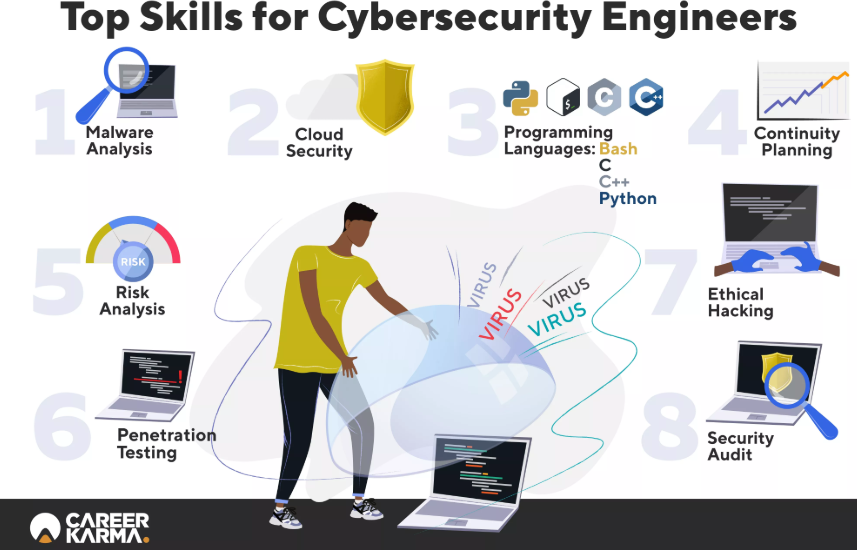The Future of Cybersecurity Jobs
The future of work is online and remote. This has been proven by the recent Covid-19 pandemic, as companies who had been reluctant to embrace the remote-work trend suddenly found themselves running an almost entire remote-based company. As things stand, it is very likely that much of the working world will remain remote-based.
The new remote-working world means two things. The first is that the world will become increasingly more reliant on technology. The second is that the need for top-notch cybersecurity infrastructure will become more important to protect the private information of companies, employees and customers. Both of these are key indicators that the tech industry, which continues to thrive even during the coronavirus pandemic, will only continue to grow and at a faster rate than ever. If you are considering making a career change, you should absolutely look into the tech industry. More specifically, you should explore careers in cybersecurity.
Cybersecurity
Cybersecurity professionals are tasked with the programming that powers the systems, methods and policies that safeguard the software and online programs from malicious third-party cyberattacks. Recent cyberattacks on companies like Sony and Capital One made headlines, and for good reason. Millions and millions of private customer information (such as social security numbers) were immediately at risk. Skilled cybersecurity engineers are tasked with finding the ways that hackers break into mainframes at companies, and fix any potential weak spots.
A cybersecurity engineer sometimes serves as a “white hat” hacker, ethically hacking into their own company to find these potential weak spots in the company’s security infrastructure. If any weak spots are found, the cybersecurity engineer immediately fixes the problem.
Cybersecurity engineers earn a decent salary, with most junior engineers making $65,000 a year. More senior roles earn as much as $137,000, according to Payscale.
If you are wondering how to become a cybersecurity engineer, you want to start by learning how to code. You may be tempted to think that doing so will require going back to school to earn a computer science or IT degree, but this is actually becoming a less popular choice among career switchers. Instead, many are opting for the much faster and more economical route of coding bootcamps.
Coding Bootcamps
A coding bootcamp is a short-term means of tech education that is hyper-focused on coding. With most students completing their bootcamp in just two to three months, there is not much room for anything else but teaching what is coding, and how to use it to earn a living. As was mentioned earlier, the working world has switched to remote. Well, so has tech education, and many coding schools also offer online coding bootcamps.
Perhaps the most beneficial feature of a coding bootcamp is the flexible tuition financing that they offer. Coding schools offer what is called an income-sharing agreement (ISA). This is actually a tuition financing option that is opposite from how a student loan works. Instead of students taking on $40,000 or more in debt that is impossible to escape from, even through bankruptcy, an ISA works as a way for a coding school to invest in their students.
ISAs offered by schools like App Academy work by waiving the bootcamp tuition so that the student doesn’t have to pay anything upfront. The student agrees to repay the cost through monthly payments based entirely on their salary after they graduate and land a job. Since the school is making an investment, with its return based on how much money their graduates can earn, it makes sense that many of these programs do their best to ensure that their grads are not only well-prepared in terms of programming skills, but are also marketable to potential employers.
To do this, most coding schools hold regular job fairs and networking events that give their students a chance to connect with potential employers. These events are also held through online means so that all students can have an opportunity to join. Many coding schools also have partnership programs with local companies that allow them to place their graduates in legitimate, well-paying programming jobs more quickly.
InfoSec Threats, Books and Training Courses
Download a Security Risk Assessment Steps paper!
Subscribe to DISC InfoSec blog by Email
Take an awareness quiz to test your basic cybersecurity knowledge
DISC InfoSec 🔒 securing the business 🔒 via latest InfoSec titles





